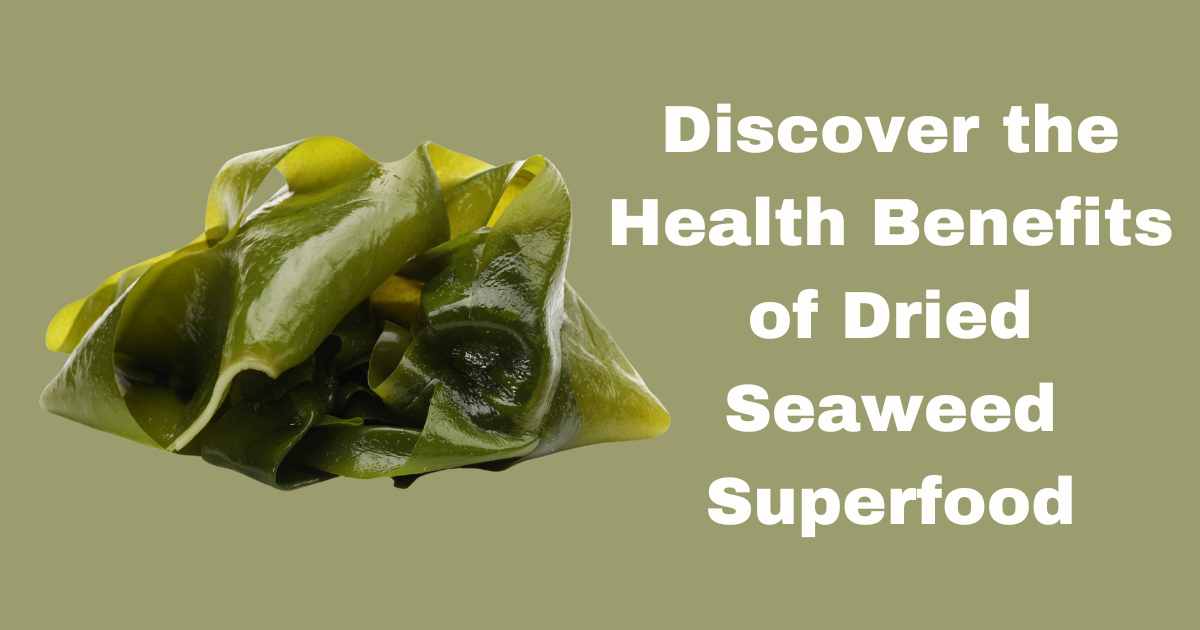Discover the Health Benefits of Dried Seaweed Superfood

Boost your health with dried seaweed! Discover its rich nutrients, health benefits, and easy ways to add this superfood to your daily diet.
Introduction
Have you ever wondered what gives certain foods the title of “superfood”? These are the nutritional powerhouses that pack an impressive punch when it comes to health benefits. One such rising star in the world of superfoods is dried seaweed. Though it’s been a staple in Asian cuisine for centuries, dried seaweed is now gaining popularity worldwide for its myriad health benefits. Let’s dive into the wonders of this oceanic superfood and discover why it deserves a spot in your diet.
What is Dried Seaweed?
Dried seaweed is exactly what it sounds like—seaweed that has been harvested, cleaned, and dried for preservation. Seaweed comes in various types, including nori, kombu, wakame, and dulse, each with its unique flavor and texture. The drying process not only extends the shelf life of seaweed but also concentrates its nutrients, making it even more potent as a superfood.
Nutritional Profile of Dried Seaweed
You might be surprised to learn that dried seaweed is a nutritional goldmine. It’s packed with essential vitamins like A, C, E, and K, along with a broad spectrum of B vitamins. But that’s not all—dried seaweed is also a rich source of minerals such as iodine, calcium, magnesium, and iron. Despite its low calorie content, it offers a decent amount of protein, fiber, and healthy fats, making it a well-rounded addition to any diet.
Health Benefits of Dried Seaweed
Rich Source of Iodine
Iodine is crucial for healthy thyroid function, and dried seaweed is one of the best natural sources of this vital mineral. A functioning thyroid regulates metabolism, energy levels, and overall hormonal balance. Including dried seaweed in your diet can help ensure you’re getting enough iodine to support these processes.
High in Antioxidants
Antioxidants are the body’s defense against oxidative stress and chronic diseases. Dried seaweed is loaded with antioxidants like vitamins C and E, as well as unique compounds like phlorotannins and fucoxanthin. These help neutralize free radicals, reducing the risk of conditions like heart disease and cancer.
Supports Digestive Health
Looking to improve your gut health? Dried seaweed could be the answer. It’s a fantastic source of dietary fiber, particularly soluble fiber, which aids in digestion and promotes a healthy gut microbiome. Regular consumption of seaweed can help prevent constipation and improve overall digestive health.
Promotes Heart Health
Heart disease remains one of the leading causes of death worldwide, but dried seaweed offers several heart-healthy benefits. It’s been shown to help lower cholesterol levels and reduce blood pressure, both of which are critical for maintaining cardiovascular health. The omega-3 fatty acids found in some types of seaweed also contribute to heart health by reducing inflammation.
Boosts Immunity
In a world where boosting immunity is more important than ever, dried seaweed stands out as a natural immune booster. It’s rich in vitamins and minerals that support the immune system, including zinc, selenium, and iron. These nutrients work together to strengthen the body’s defenses against infections and illnesses.
Aids in Weight Management
If you’re trying to manage your weight, dried seaweed can be a valuable ally. It’s low in calories but high in fiber, which helps you feel full and satisfied after eating. Additionally, the iodine in seaweed supports a healthy metabolism, which can aid in weight loss or maintenance.
Dried Seaweed in Traditional Medicine
Dried seaweed has a long history in traditional medicine, particularly in Asian cultures. It has been used to treat a variety of ailments, from digestive issues to skin conditions. Modern science is now validating many of these traditional uses, and dried seaweed is increasingly being incorporated into natural health remedies around the world.
How to Incorporate Dried Seaweed into Your Diet
Cooking with Dried Seaweed
Dried seaweed is incredibly versatile and can be used in a variety of dishes. You can add it to soups, salads, and stir-fries for a nutritional boost. It can also be rehydrated and used as a wrap for sushi or mixed into rice dishes. The possibilities are endless!
Snacking on Dried Seaweed
For a quick and healthy snack, look no further than dried seaweed sheets. They’re light, crispy, and packed with flavor. You can find them in a variety of flavors, from plain to spicy, and they’re perfect for snacking on the go.
Seaweed Supplements
If you’re not a fan of the taste or texture of dried seaweed, supplements are a great alternative. Seaweed supplements come in various forms, including capsules, powders, and tablets, making it easy to reap the benefits of seaweed without changing your diet.
Potential Risks and Considerations
While dried seaweed offers numerous health benefits, it’s important to consume it in moderation. Overconsumption of iodine can lead to thyroid problems, so it’s best to enjoy seaweed as part of a balanced diet. Additionally, some people may be allergic or sensitive to seaweed, so it’s important to introduce it gradually into your diet.
Sustainable Seaweed Harvesting
As with any natural resource, it’s important to consider the environmental impact of seaweed harvesting. Overharvesting can lead to ecological imbalances, so it’s crucial to choose products that are sourced sustainably. Look for certifications or brands that prioritize environmental responsibility.
Comparing Dried Seaweed to Other Superfoods
How does dried seaweed stack up against other superfoods like kale or chia seeds? While all superfoods offer unique benefits, dried seaweed stands out for its rich mineral content and bioactive compounds. It’s a great addition to any diet, especially for those looking to boost their intake of iodine and antioxidants.
Dried Seaweed in the Global Market
The global demand for dried seaweed is on the rise, driven by its popularity as a health food. In Asia, seaweed has long been a dietary staple, but it’s now gaining traction in Western countries as well. This growing demand is having a significant economic impact, particularly in coastal communities where seaweed farming is a major industry.
The Future of Dried Seaweed as a Superfood
As research into the health benefits of seaweed continues, we can expect to see even more innovations in seaweed products. From seaweed-based snacks to supplements and even skincare products, the future of dried seaweed as a superfood looks bright. Keep an eye out for new developments and consider incorporating this nutrient-dense food into your daily routine.
Conclusion
Dried seaweed is more than just a trendy superfood—it’s a nutrient-packed powerhouse with a long history of use in traditional medicine. Whether you’re looking to boost your thyroid health, support your heart, or simply add more nutrients to your diet, dried seaweed is an excellent choice. So why not give it a try? Your body (and taste buds) will thank you! Plus, with so many ways to enjoy dried seaweed, from snacking to adding it to your meals, it’s easy to incorporate into your routine. Just remember to consume it in moderation and opt for sustainably sourced products to protect the environment.
FAQs
1. What is the best type of dried seaweed to eat?
The best type of dried seaweed depends on your personal preferences and nutritional needs. Nori is popular for its mild taste and use in sushi, while dulse has a richer, smoky flavor. Wakame and kombu are also great options for soups and salads, offering unique textures and flavors.
2. Can dried seaweed be eaten daily?
Yes, dried seaweed can be eaten daily, but it’s important to consume it in moderation due to its high iodine content. Overconsumption of iodine can affect thyroid function, so aim to incorporate seaweed a few times a week as part of a balanced diet.
3. Is dried seaweed safe for children?
Dried seaweed can be safe for children when consumed in appropriate amounts. It’s rich in essential nutrients, but be mindful of portion sizes to avoid excessive iodine intake. Always introduce new foods to children gradually and consult with a healthcare provider if unsure.
4. How does dried seaweed compare to fresh seaweed?
Fresh and dried seaweed offer similar nutritional benefits, but dried seaweed is more concentrated and has a longer shelf life. Dried seaweed is also more convenient to store and use, while fresh seaweed may have a more delicate flavor and texture.
5. Can dried seaweed help with weight loss?
Yes, dried seaweed can aid in weight loss due to its high fiber content and low calorie count. The fiber helps you feel full longer, reducing the urge to snack between meals. Additionally, the iodine in seaweed supports thyroid health, which can help regulate metabolism.




